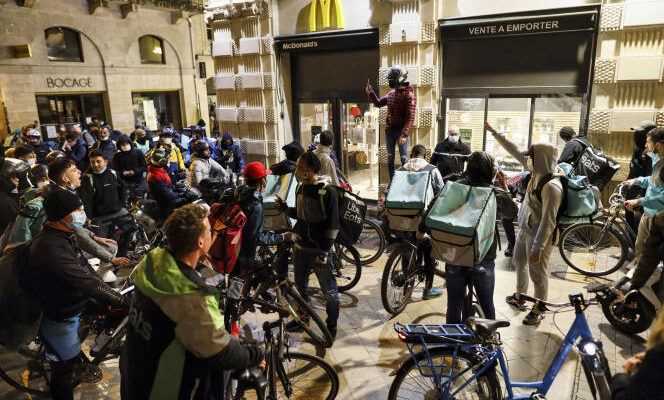In the Porte Saint-Denis district of Paris, home of trendy restaurants in the capital, no one pays attention to them anymore, even if their bag is easily recognizable. All day long, they squat in the self-service bicycle stations, their gaze riveted on the screen of their telephone. In their improvised HQ, they watch for the next notification likely to bring them some money.
They are the couriers of Deliveroo, Glovo or even Uber Eats: delivery men under 30, mostly of African origin. Having become a symbol in spite of themselves, that of the uberization of the economy, in reference to the most famous of platforms, Uber. On December 3, the industrial tribunal will settle yet another dispute between the Frichti company and couriers asking for the recognition of the existence of an employment contract. As cases of this type multiply before the courts, these platforms have become the symbol of a questioning of the French social model.
“ I was a courier for four years at Uber Eats and Deliveroo, says Jérémy Wick, member of the CGT union of bicycle couriers in Gironde. At first, my income was not that bad, we were even entitled to a bonus of 150 euros if we made deliveries in the evening. Two years ago, I could earn 2,500 euros gross per month. Then the bonuses were removed. My income has fallen to around 1,500 euros gross per month, which of course must be removed from the charges, the material… It is very fluctuating, depending on the orders that we manage to obtain. There is no stability. “
No boss, no paperwork, no commitment: work like a video game with the possibility of earning a few cents, in return for activities as diverse as delivering a burger on a bicycle after receiving an alert or clicking relentlessly on links or images from home, on behalf of websites. According to INSEE, around 200,000 self-employed workers used a digital platform or other intermediary to meet their customers in 2017.
Between that year and 2019, the number of microentrepreneurs active on these platforms in the transport sector alone doubled, from 20,000 to 40,000, according to a report of the Social Affairs Committee of the Senate of 2020. A minority which is only “The visible part of the iceberg of the difficulties encountered by self-employed entrepreneurs”, denounces François Hurel, the president of the Union des autoentrepreneurs. While he can boast a huge customer base through the platform, the worker affiliated with him does not get a minimum monthly salary or paid time off. Notifications punctuate his daily life: “The system prompts him to leave his phone on permanently, for fear of missing a race”, laments Brahim Ben Ali, secretary general of the national VTC intersyndicale.
You have 76.66% of this article to read. The rest is for subscribers only.
